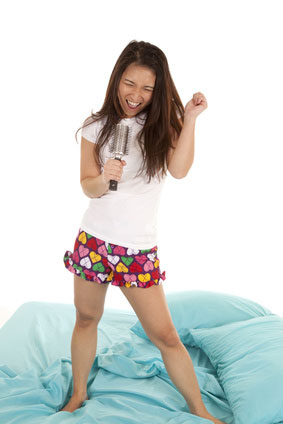 Do you record vocals in a bedroom? Most folks who record in a home recording studio do so in a converted bedroom (or maybe not even converted – if you sleep in there too, I mean). Bedrooms are notoriously rectangular. I know, that’s a profound observation , right? Well, the reason I point it out is that rectangles (and a square is a rectangle too, which you should remember from your math classes) have opposite sides that are equal and parallel. That means sound will bounce around in a very predictable and interfering way, creating multiples and even nulls at certain frequencies. In English, this means that what you hear in rooms like this will NOT be a good representation of the REAL sound. Certain frequencies will be hyped and others will be barely audible or even missing entirely (wave mechanics is pretty interesting and very applicable to audio – I’m talking about destructive and constructive interference here, btw).
Do you record vocals in a bedroom? Most folks who record in a home recording studio do so in a converted bedroom (or maybe not even converted – if you sleep in there too, I mean). Bedrooms are notoriously rectangular. I know, that’s a profound observation , right? Well, the reason I point it out is that rectangles (and a square is a rectangle too, which you should remember from your math classes) have opposite sides that are equal and parallel. That means sound will bounce around in a very predictable and interfering way, creating multiples and even nulls at certain frequencies. In English, this means that what you hear in rooms like this will NOT be a good representation of the REAL sound. Certain frequencies will be hyped and others will be barely audible or even missing entirely (wave mechanics is pretty interesting and very applicable to audio – I’m talking about destructive and constructive interference here, btw).
Why bedrooms can also sound bad while recording
So that is the main reason why having a studio in a bedroom can be problematic. But that stuff applies mainly to mixing and mastering, where you’re more concerned with what you hear. What about sound sources like vocals? How does a rectangular room affect the input of sound into a recording? The biggest problem is echo/reverb. You notice this most, perhaps, when someone records a video and the person speaking in the video is several feet away from the camera. It sounds all echo-y, right? And not very professional.
Here are some ways to fix the problem
Well you can fix that, or minimize it greatly, by simply getting closer to the microphone. I recommend just a few inches if possible, but things can still be improved greatly by having a mic just a foot or two away. You can hear and see the dramatic difference of this in video I made for the post How To Get Good Audio On Your Videos. [update: We also posted a 6-part series to help with this, which you can access here: Improve The Quality Of The Audio You Record At Home]
But there are other things you can do to get better sound on vocals recorded in a bedroom. I detailed them all in my post How to Build a Home Recording Studio: Part 2 – Four Tips For Preventing Noise. Since preventing noise of any kind (background noise from computers, lawnmowers, barking dogs, the TV downstairs, echo, microphone self-noise, etc.) is one of the the primary goals of recording good audio, the four tips in that post should help a lot, regardless of what kind of mic you use.
What about recording with reverb?
But there is one aspect I had not thought much about, which is singing. Once you are avoiding as much noise as possible while recording, is there anything about recording ind a bedroom that can still impart negative stuff on your voice recording? I recently read an article that suggested that bedrooms make your vocals sound “flat.” That’s not in the musical sense of being off-pitch, or in the frequency sense of being equally loud across the spectrum. The article used the term “flat” to mean boring or uncolored in any way by any pleasant reflections or natural ambiance. OK, I can buy into that. A lot of the best commercial studios have recording spaces that flatter a vocal with the natural reverb and spacious sound. But the author stated that one way to fix that was to apply a reverb effect BOTH while recording the vocalist, AND after the fact in the mix.
As a singer who used to record with reverb, I must strongly disagree that letting a singer hear their voice in the headphones with reverb improves their performance – at least not for everybody. I found that when I monitored my voice with reverb while singing, I was more likely to be off-pitch more often. It wasn’t until I made the decision to always record dry and apply the reverb (if any) only to the recording in the mix that I was able to get the most accurate pitch down on tape (yeah, back in the old days;)). It makes sense. Reverb may sound nice, but it does blur things a bit, giving you a nice sound maybe, but not an accurate one. You may be really happy while you’re singing, but then be horrified by the result. That’s how it was with me anyway. I admit that for some, it may help them relax and feel better while recording, which may be a good thing. But I think you should try to record without any reverb at all if possible. Adding it in the mix will help get rid of any “flat-ness” a bedroom may impart.
I hope all of those tips will help you get a much more professional result when recording vocals in a bedroom.
Cheers,
Ken
Leave a Reply